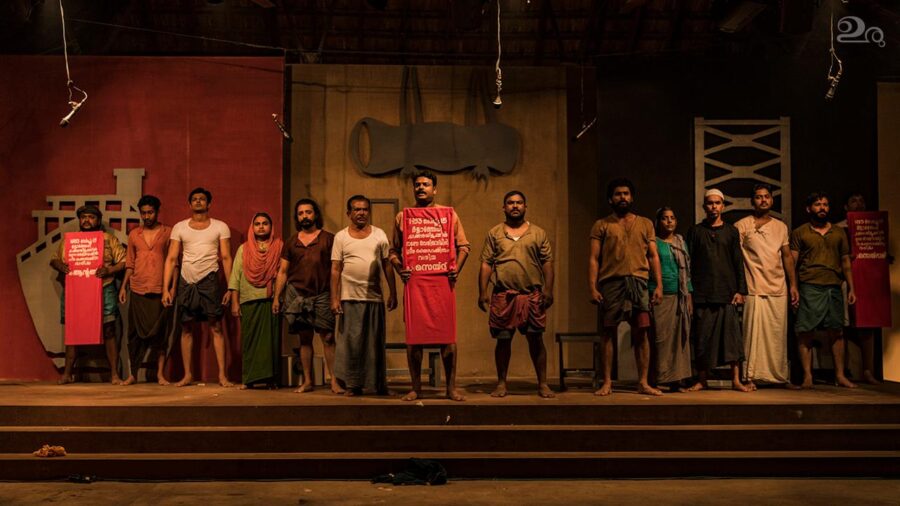In his maiden feature film Annayum Rasoolum, Rajeev Ravi mapped the narrow lanes and waterways of Vypin and old Kochi and blended them into the film’s narrative like they were part of his characters’ mindscapes. His third feature film Kammattipadam was about the descent of certain areas and people of Ernakulam city into darkness as another city, a brighter and more sophisticated one, rose on its edges. With Thuramukham, the feature film he is currently working on, the cinematographer-filmmaker is returning to Kochi, his home town and muse, to narrate a lesser-known slice of the city’s history.
Thuramukham is based on a play of the same title, written in 1968 by KM Chithambaram, a school teacher and a renowned playwright; it won the Samastha Kerala Sahithya Parishad award in 1973. Centred around a Muslim family in Mattancherry – a mother, her son and two daughters – the play unravels the details of life in Mattancherry where the working class reeled under acute poverty, unemployment and exploitation by shipping companies and labour contractors. People came there from all over the State, pinning their hopes for a means of livelihood to the Kochi port that was opened in 1928, and the commercial hub that formed around it. Wages were petty, but hundreds of headload workers waited every day at the wharf to ferry cargo from ships berthed a little away in the sea. Labour contractors hired by steamer agencies used a notorious method to select the workers for the day. A copper coin, known as chappa, was thrown into the air, causing a commotion among the workers who fought like beasts to seize it. It was against this inhuman practice that one of the first massive working class agitations took in place in Mattancherry.
Malayalam new-wave filmmaker PA Backer’s Chappa (1982), which won the National Film Award for best Malayalam film, was based on this system of labour exploitation. The core of Chithambaram’s play is the workers’ uprising against the Chappa system, now known as Chappa Samaram, which culminated in a blood shed. The State police clamped down on the agitation on September 15, 1953, by firing at a crowd of strikers who were protesting against the arrest of trade union leader TM Abu. The incident killed three protestors Syed, Saidalvi and Antony.
Last year, Chithambaram’s son Gopan Chithambaram, a playwright and film scenarist, revived Thuramukham and brought it back to the stage with the help of Collective Phase One, a production banner Rajeev Ravi is a part of, and Uru Art Harbour, a cultural center in Kochi. Many of the cast in the revived play were non-professional actors from Mattancherry and neighbouring areas. Some of them were grandchildren and relatives of the workers who took part in the 1953 agitation.
Gopan is also the screenwriter of Rajeev’s film. A faculty of drama at Kalady Sree Sankaracharya University of Sanskrit, he was the co-scenarist of Amal Neerad’s Iyyobinte Pusthakam. Like Rajeev, he grew up in Kochi, witnessing the small-town’s growth into a metropolitan city that we see today.
“Rajeev and I grew up in the same neighbourhood of Ernakulam. The new Ernakulam city was born in front of our eyes,” he says. Thuramukham is one of the few literary texts about the Mattancherry firing incident, a vital one that shaped the labour movements in Kochi. In the 70s and 80s, it was widely read and discussed, and also studied academically. However, in the last two decades, the script and the incident faded away from the public memory. “We felt it was important to bring it back to the mainstream and to inform the new generation of this historical agitation,” says Gopan. “An understanding of one’s own history is essential. The more we trace and understand our history, the further we will be able to move ahead.”
Recommended
When the film team set out to do pre-production research on the subject, they realised they were right on time. “Most of the people who were part of the rebellion are dead. Not may of those who remain have a clear memory. This was, in many ways, our last chance to record their accounts. We met several women, wives and daughters of the men who took part in the revolt, who shared with us what they know of the incident,” says the writer.
Thuramukham is being shot primarily on a set, a replica of old Mattancherry, erected in Kannur, and partly in Kochi. Apart from stars such as Nivin Pauly, Indrajith and Poornima Indrajith, the film’s cast includes the new actors who were part of Gopan’s play last year.
Feature Image: A scene from Thuramukham, the play directed by Gopan Chithambaram, staged at Uru Art Harbour in 2018



